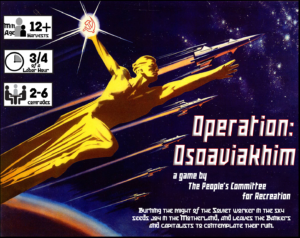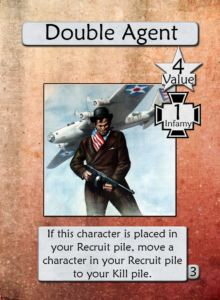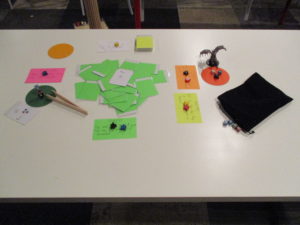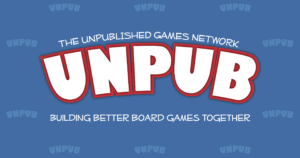Unpub Preview: Operation: Paperclip
Unpub Previews allow designers the opportunity to talk more in depth about the development of their games in the Unpub Network.
I'm pretty excited to run people though Operation: Paperclip. In game terms: its a two tier-auction game with simultaneous turns reminiscent in structure to Libertalia, Eminent Domain: Battlecruisers, or Eggs to Empires, though player's decks are a-symmetrical which they draft through a bidding process.
The skin of the game is post World War 2 Germany; as players take on the rolls of Russian and American agents scrambling to assemble superior technical teams, or Jewish vigilantes hunting down the worst perpetrators of the war; or finally players can assume the roles of agents of the ODESSA network attempting to sneak high-ranking German officers to safety in South America.
Let's see what else Ben has to say about Operation: Paperclip, which will be showing up on tables soon...
What was your inspiration for the game?
I set out with the goal of trying to represent the real life Operation: Paperclip into a game, so theme really lead all the design choices- which was quite the opposite experience from other game’s I’ve made which was mechanics first. Operation: Paperclip is set in post-World War 2 Germany and players take on the role of either the Americans or Soviets trying to recruit German scientists to assist in their own technology development, as Jewish vigilantes hunting down the worst perpetrators of the war, or as German operatives of the ODESSA network trying to smuggle high-value Germans to safety in South America.
One challenge with this subject matter is to stay true to the historical themes, but still make a game that’s enjoyable to play. One of the themes that I need to convey is a risk-reward assessment with imperfect information (in real life -and in the game- the dilemma being: "we want this scientist for our rocket program, but he probably did some pretty bad stuff- what should we do with him"?) So risk/reward itself seems an easy translation for a game, but the heavy subject matter is a challenge to shape into an experience that gamers will want to be a part of. I think it’s important to figure things like this out though, or else we will never get games that deal with any weighty moral questions- and simulation adds dimensions to experiencing issues beyond what just reading about them will do for us.
What is your favorite part of the game?
I like the mix of mechanics that blend a medium weight game into a short time span. We are still working out some of the scoring, but the base feels very solid to me.
To your knowledge, What do other people find most interesting about the game?
Fun simultaneous turns of a 2 tier-auction game is an easy sell for folks, and it’s been gratifying to see play-testers respond so positively to even early iterations of the game (this is also a new experience for me, usually Its quite a slog early on to whittle out the game from a heap of ideas ).
What has been the most challenging part of designing the game?
Trying to balance the game experience for 3 a-symmetrical sides so that they remain unique, but still feel like people are playing the same game.
What advice would you give to players attempting the game for the first time?
Remember: points are valued relatively -not in absolute terms- so it may be better to stick your finger in another player’s eye than to get a medium-sized payout.
What has surprised you most in play-tests of the game?
Normally for me I have to scrap giant sections of a game after each sprint of play-testing in order to carve away the complexity of everything I want in order to reveal the true game underneath. It’s been very nice not having to cast off one idea after the next in order to get a lean and fun functioning system.
People who like_____will like this game. Why?
If players like Libertalia, Eminent Domain: Battlecruisers, For Sale, or Eggs and Empires they will like some of the mechanics in Operation: Paperclip- as all these games have some form of simultaneous turns competing over shared resources. Additionally, players who like World War II themes will probably like this middle-weight card game, which doesn’t take too long to play.
Tell us anything else you want to say about your game that I haven’t asked or you haven’t said already.
Historically, the Soviet counterpart to Operation: Paperclip was Operation: Osoaviakhim. I thought it would be fun for the box back of the game box to be an imagining of the Soviet counterpart to this game, so that’s what I did.
For more information, photos and to find out where you can try Operation: Paperclip, please visit the game's Unpub.net Page!




